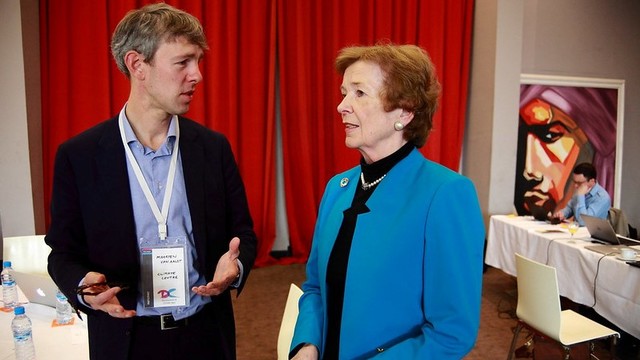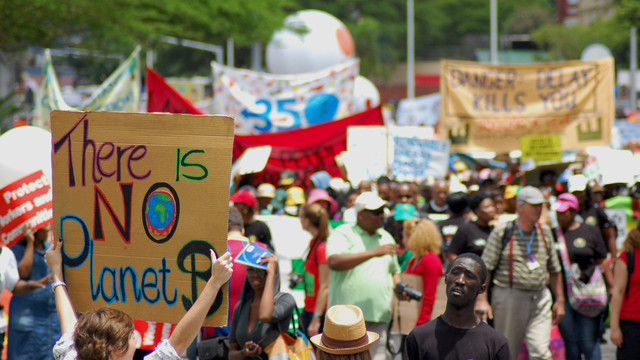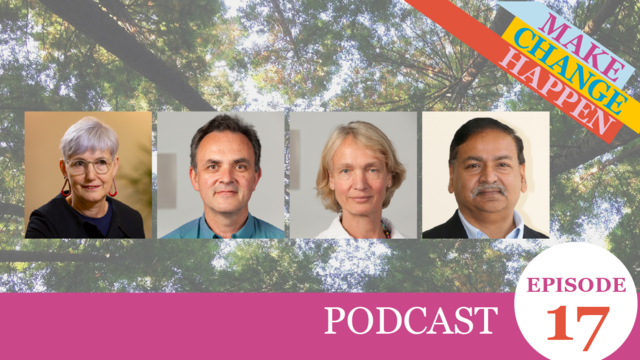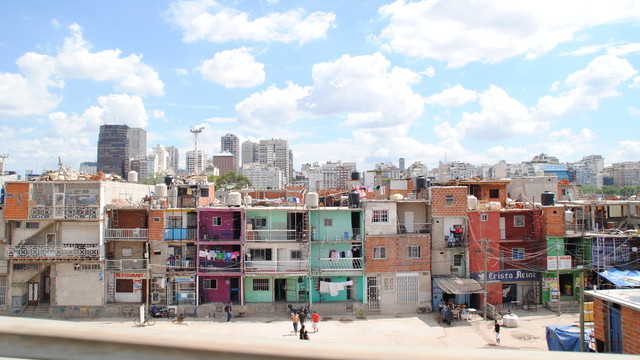Fifty years on, 'Only One Earth' rings true
On IIED’s 50th birthday, director Andrew Norton links our founder’s vision with the urgent global crises of today and finds new hope for change in locally-led social movements.


There is 'only one Earth'. People who have seen Earth from space often report a profound feeling of awe and interconnection, and a renewed sense of responsibility for taking care of the environment (Photo: Kristian Fagerström, via Flickr, CC BY-SA 2.0)
This year marks 50 years since the International Institute for Environment and Development (IIED) commenced its work. At that time, the idea of combining the environment and development agendas was new and needed to be fought for.
Over the years, research including our own added to the evidence base for sustainable development. Today, it is widely accepted that protecting the planet and ensuring humanity thrives are the same thing.
Indeed, with the adoption of the Sustainable Development Goals (SDGs) in 2015, this became the dominant global narrative.
Here for the whole journey
IIED has played an important role in forging that consensus. Alongside our diverse partners, we have engaged actively at all the key points on that journey: from the two Earth Summits in Rio de Janeiro to the Paris Agreement on climate change and three UN Habitat conferences.
We know that the changes in international agreements and frameworks – although important – have yet to gain the necessary traction at the level of global geopolitics and economy.
We are still facing critical and urgent crises in relation to climate change, the assault on the natural world and growing inequality (PDF).
On top of this we face a pandemic: an emergency rooted in the degradation of the natural world. This is a harbinger of worse things to come if humanity cannot achieve the transformational change needed to ensure a thriving future for people and planet.
A pioneering text
The book ‘Only One Earth: The Care and Maintenance of a Small Planet’ by Barbara Ward and René J Dubos has a special significance for IIED.
Before the United Nations Framework Convention on Climate Change (UNFCCC), the Convention on Biological Diversity (CBD), the 1992 Earth Summit, and the big global conferences of the late 20th century on gender equality and children’s rights, there was the 1972 Stockholm Conference on the Human Environment.
‘Only One Earth’ was commissioned as the conference’s unofficial report. With contributions from a global group of authors, Barbara and Rene took responsibility for compiling the final text, also published in 1972.
Soon after, Barbara took over the Institute for International Environmental Affairs, on the condition that development be added to its mission. Established in 1971, this US-based think tank had helped shape the agenda for Stockholm.
One of her early decisions was evolving the name of the organisation to better reflect its broader remit. And so Barbara Ward became the first director of the International Institute for Environment and Development.
Time magazine called Barbara Ward one of the 20th century's most influential visionaries. Included in this edited montage are some Ward's most famous quotes and interviews, including footage from the 1972 film Survival of Spaceship Earth
Ahead of the curve
‘Only One Earth’ engages with the complexity and uphill struggle of global change and lays it out with startling prescience. It is an informed, passionate and comprehensive call to action – recognising that urgent action is needed but offering no simple, facile solutions.
The narrative repeatedly returns to the challenges of collective action between nations. It emphasises that the great tests of our time – achieving environmental and social justice – cannot be met by countries acting alone or separately.
A decade and a half before James Hansen’s watershed testimony to the US Congress (PDF) on global warming, ‘Only One Earth’ rang the alarm. The book predicted (with considerably accuracy) that the earth’s temperature could rise by 0.5 degrees centigrade by the end of the 20th century.
Failure of collective action
If Barbara Ward were with us now, she might be proud to have set out the global challenges so clearly and accurately, and so early. Indeed, she played a big role in laying the groundwork for the understanding embedded in the SDGs.
But she would doubtless be distressed that many of the dangers she identified – from the climate crisis to nature loss, from growing inequality to unsustainable production and consumption, and from growing social exclusion to chaotic and poorly governed urban growth – have been so weakly addressed.
It is only by forthright cooperation and action at the global level that nations can protect mankind from inadvertent and potentially disastrous modification in the planetary weather system – 'Only One Earth'
Given the huge task the world currently faces in charting a just pathway out of the COVID-19 pandemic, her observations on the challenges of collective action between nations are particularly poignant:
“So locked are we within our tribal units, so possessive over national rights, so suspicious of any extension of international authority that we may fail to sense the need for dedicated and committed action over the whole field of planetary necessities. Nonetheless there are jobs to be done which perhaps require at this stage no more than a limited, special and basically self-interested application of the global point of view.
“For instance, it is only by forthright cooperation and action at the global level that nations can protect mankind from inadvertent and potentially disastrous modification in the planetary weather system, over which no nation can assert sovereignty. Again, no sovereignty can hold sway over the single, interconnected global ocean system which is nature’s favourite sink and man’s favourite sewer.” – 'Only One Earth' (p217)
Taking on those challenges
IIED’s current strategy addresses five key global challenges of our age: increasing inequality, the climate crisis, the assault on the natural world, growing urban risk and unsustainable markets.
Building on our original ethos, we work with others to apply new thinking, technology and a range of knowledge systems to bring marginalised people – those who rely most on the land and sea – into key decision-making forums.
Change for the benefit of many is often uphill. The COVID-19 pandemic has added a further urgent layer of peril that challenges us all to respond, and which at present the international system seems unable to address with the justice, urgency and efficacy that is needed.
The appalling inequality of the availability of vaccinations around the world betrays a continuing inability to act with solidarity – but also with basic common sense – in relation to common interests. Simply put, ‘no one is safe until everyone is safe’.
Working with today’s leaders
The hope that Barbara Ward would maintain at this point would surely be based on the passion and strength of social movements and environmental and social activism.
She could look to the grassroots groups rising to the challenges COVID-19 wrought on their communities, and to the young climate activists who are making their generation heard.
These are the leaders shaping a fairer world, seeking to force government and corporations to make the changes which are urgently needed for ‘the care and maintenance of a small planet’.
This year, as IIED celebrates 50 years of research, dialogue, learning and sharing, we will reflect on what has been achieved and the vast challenges that remain.
In particular, we will be looking for the ways in which we can support social movements – working from the local to the global level – to continue to drive the changes we need to meet the Ward and Dubos’ vision for urgent action.



